We continue to receive queries/complaints regarding settlement of claims submitted by our members and retirees to TPAs concerned.
Insurance companies use complicated jargons in Health Policies the impact of which insured fail to comprehend fully. Members realize the adverse effect of these difficult to understand terms at the time of settlement of their claims. This post is a step towards understanding PPN rates with its impact on the claim process.
It would have been better if the Bank had added more instances of important procedures etc. where invariably PPN rates are invoked by the Network Hospitals.
The concept of PPN is widely present in the US to ensure that insured funded healthcare cost is less than individual funded cost. It came into practice in India after Insurance companies came across a spate of inflated claims when the patient had declared that he/she has insurance cover and wishes to go for cashless treatment.
PPN stands for Preferred Provider Network /Preferred Partner Network.
It means a Network of hospitals in India which have agreed to cashless package pricing for the insured. Every hospital that has a tie-up with the insurance company maintains three different rates for the same treatment.
- PPN rates applicable for claim settlements under plans offered by public sector health insurers.
- Cash rates applicable – treatment costs are payable by the patient in cash.
- Non-PPN rates applicable for claim settlements under plans offered by private health insurance companies which are tied-up with the hospital.
for example –Hospital XYZ has three rates for angioplasty:
| PPN Hospitalization rate | Cash rate | Non-PPN Hospitalization rate |
| INR 2lakhs | INR 2.5 lakhs | INR 2.5 lakhs or more |
The Bank’s circular cites undernoted instances for the settlement of claims with PPN rates.
Cataract operation with a cap of ₹75,000/- PER EYE uniform for all including cost of laser & multifocal lens within the limit. Advancement in treatment & surgical procedures under cataract to be made payable.
PPN charges are not applicable for cataract claims and to be processed as per specified limit of ₹75,000/-. Investigation charges and medicine charges levied during hospitalization will be reimbursed in full irrespective of room occupied. Pro rata deduction will not be applicable on investigation charges and medicine charges
Settlement of Claims:
In the event of the insured utilizing room rent higher than his/ her limits then following procedure will be followed
in settling the claim:
a) If the hospital maintains the tariff depending upon the room rent then claim will be settled on the rates specified therein for all charges incurred.
b) If such list is not available, then the charges will be settled on pro-rata basis.
c) In any case the pro-rata claim cannot be below the procedure charges of such treatment.
d) In case of death also the claim will be settled on pro-rata basis if insured is utilizing room rent higher than his/her limit.
e) Claims will be settled on proportionate basis if higher room rent is opted, however the minimum payment will be made as per PPN tariff irrespective of higher room rent.
In simple words:
1) PPN charges are not applicable for cataract claims and such claims are required to be processed as per specified limit of ₹75,000/-
2) PPN rates can be made applicable in the event of the insured utilizing room rent higher than his/ her limits as explained above.
3) PPN rates may also be applied to in respect of specified diseases by the Network Hospital where cashless treatment is taken subject to some restrictions by the Bank.
As per feedback received from members, following deductions are generally made by the TPAs, sometimes unfairly:
- Policy terms related deductions: If you have room-rent limits, capping on specific diseases, co-payments, maternity limits;
- Non-medical expense related deductions: IRDAI stipulates that insurers need not pay for non-medical expenses; RBI Retirees Association Chandigarh has asked the bank to reconsider and waive these deductions.
- Unfair deductions: Often insurers might make unfair deductions simply because of errors or misinterpretation of medical documents. This is where a members should immediately take up the matter with the TPA and if no reasonable response is forthcoming, the matter should be escalated to appropriate authorities as given in the RBI circular.
It may be noted that as the policy has been placed with The New India Assurance Co. Ltd. which is a public sector Insurance company and is a member of GIPSA, members have to bear the impact of PPN rates for cashless treatment.
Policyholders can avail cashless facility in PPN hospitals approved/empaneled by GIPSA-
GIPSA-General Insurance Public Sector Association – a group of four General insurance companies: New India Assurance Company Ltd, National Insurance Company Ltd, United India Insurance Company Ltd, & Oriental Insurance Company. GIPSA provides coverage for common illnesses such as kidney stones, cataracts, appendicitis, hysterectomy, angioplasty, etc.

July 19, 2023 at 6:37 am
skjain.sumat@gmail.com